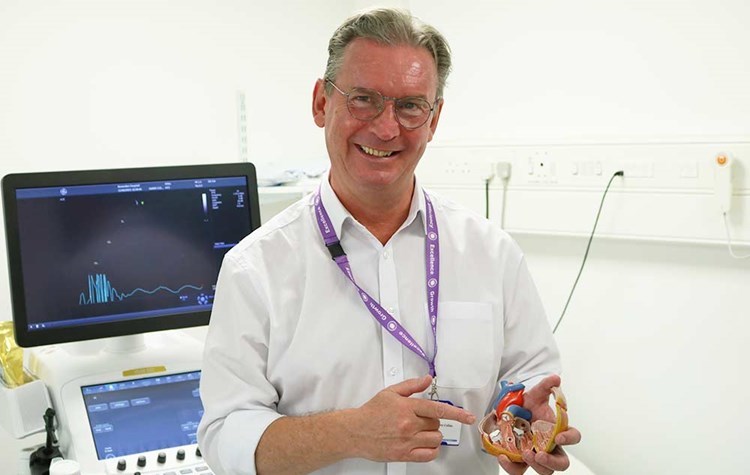Published on 31 August 2023
How much do you know about your heart health? According to the British Heart Foundation, there are 7.6 million people living with heart and circulatory diseases in the UK. Every three minutes someone dies from a heart or circulatory disease. There are more than 100,000 hospital admissions each year due to heart attacks and one stroke occurs every five minutes.
Read on to learn about vascular disease, checking your heart rhythm and how our hospital can help you with a fast diagnosis.
What is vascular disease?
Vascular disease is primarily caused by the build-up of fatty deposits which causes blockages or narrowing in blood vessels.
The accumulation of these deposits can happen over a long period of time and with no obvious symptoms until the arteries and veins become so damaged, the blood flow to vital organs and muscles is compromised. This can cause difficulty with mobility, pain and tissue death.
Vascular disease is the most common precursor to coronary heart disease and heart attack and can also cause strokes by affecting the arteries in your neck.
There are four main types of cardiovascular disease (CVD):
- Coronary heart disease
- Stroke and Transient Ischaemic Attack (TIA)
- Peripheral Arterial Disease
- Aortic disease
What are the risk factors of vascular disease?
The exact cause of the thickening or hardening of the arteries is unknown, but several risk factors accelerate the formation of fatty deposits in the arteries:
- Being male. The disease is more common in men
- Family history of vascular disease, angina, heart attacks or stroke
- High blood pressure – read our article to learn how to stay on top of your blood pressure
- Smoking
- Diabetes
- Being overweight
- High cholesterol levels - Did you know that more than two in five people in England are living with high cholesterol? Manage your cholesterol levels here
- An unhealthy diet
- Lack of exercise
- Stress
Why should you check your heart rhythm?
According to Arrhythmia Alliance, the easiest way to detect an arrhythmia is to feel your pulse. Checking your pulse for just 30 seconds means you can detect if your heart rhythm is irregular, too fast, too slow, or just right. More than three million people in England are affected by an arrhythmia (irregular heart rhythm) and atrial fibrillation (AF), the most common arrhythmia, causes 12,000 debilitating and fatal AF-related strokes in the UK each year.
Below are answers to a few common questions about heart rate, so you’re aware of what to look out for.
Is heart and pulse rate the same?
Although they are connected, they aren’t the same. Your heart rate is how fast your heart is beating. When your heart beats, it circulates blood around your body. Your pulse is the pressure in your arteries that rises when your heart pushes out more blood to circulate, but between beats your heart relaxes and this brings your pressure back down again. You can gently feel your pulse, by using your index and ring finger together, on your neck, wrist and inside your elbow.
What is a high heart rate?
Your heart rate is measured by the number of times your heart beats per minute. A normal resting heart rate should be between 60 to 100 beats per minute, but if your heart rate is over 100 beats per minute when you are at rest, this is considered a high heart rate (tachycardia). You should visit your GP if you are concerned about a pounding heart or are experiencing palpitations.
Is a heart rate of 40 bad?
A heart rate below 60 beats per minute when you are at rest is considered slow (bradycardia) but this is common if you exercise a lot, are taking beta-blockers or are a fit and healthy young person. However, if you notice your heart rate is slower than normal, you’re feeling faint, fatigued or dizzy, you should talk to your GP.
By checking your pulse and identifying any irregularities, you can help to get a diagnosis and access the treatment required to help. Get to know your pulse here.
How to get on top of your heart health
You can have screening with your GP, and if you’re identified as having a potential cardiac risk, one option is to refer you to a specialist at Benenden Hospital for further review and diagnostic tests.
Prevention is key to looking after your heart, especially if there is a history of someone in your extended family who has suffered a sudden and unexpected death due to heart problems. Often the simplest measures can reduce risk.
There are many things that you can do to improve your heart health and lower your heart age, these include:
- Stop smoking to lower heart risk
- Reduce saturated fats
- Be more active to improve your cardiovascular health
- Mind your weight with heart healthy meals
- Keep your blood pressure in check
At our CQC rated Outstanding hospital, our cardiology specialists offer a range of tests and scans, from heart monitoring to CT coronary angiograms and MRI scans. We can help you get on top of your heart health.
It’s easy to make an appointment; you can ask your Consultant, complete our online booking form or contact our Private Patient team via Livechat or on 01580 363158.






